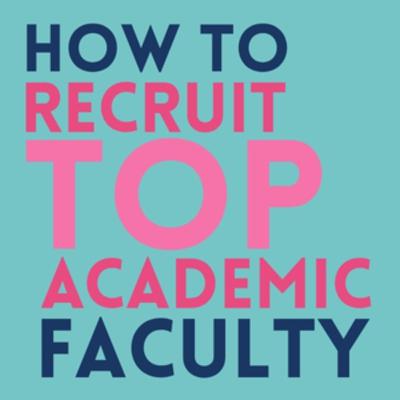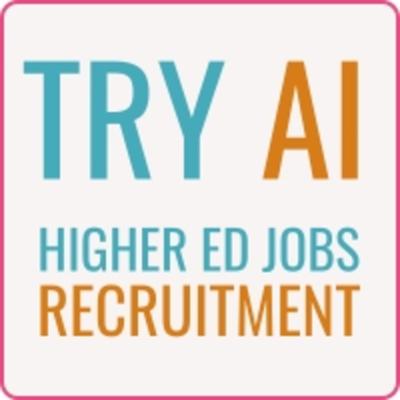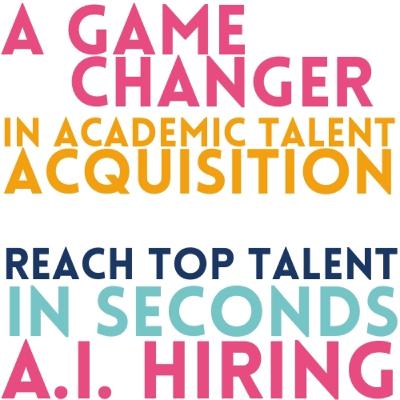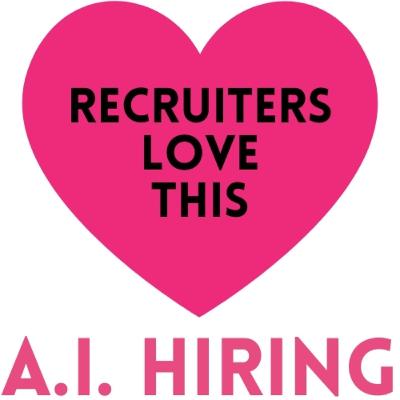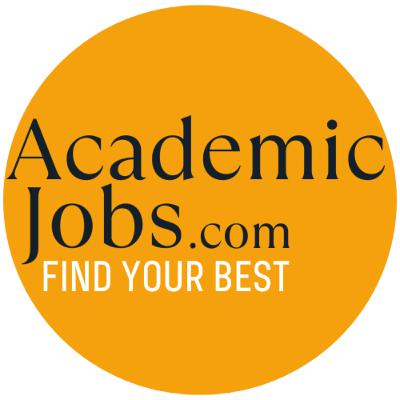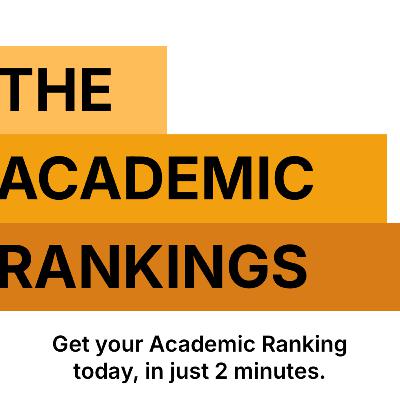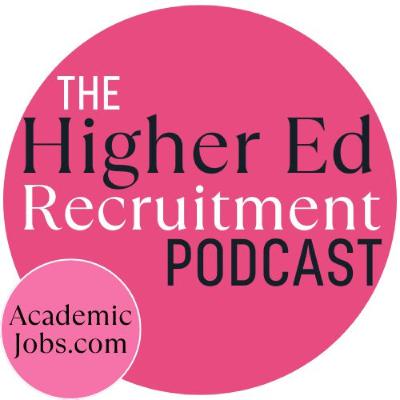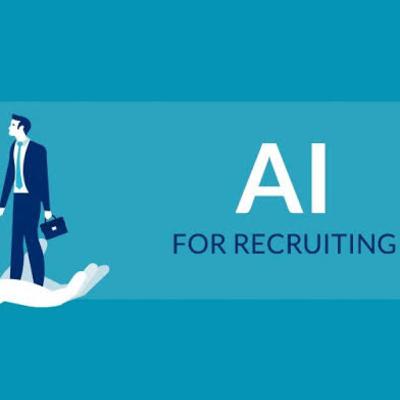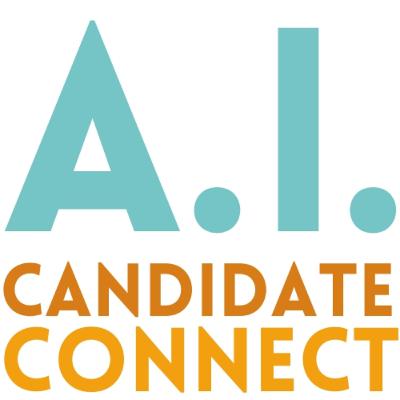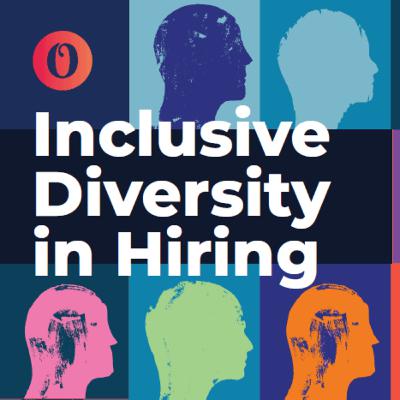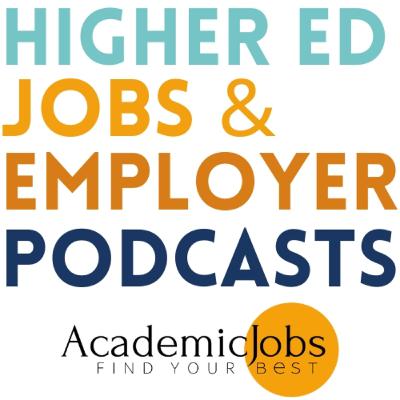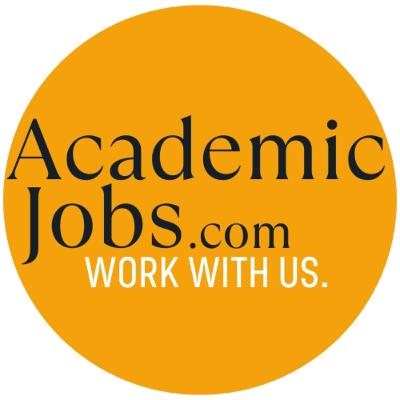Discover Higher Ed Jobs - The Recruitment Podcast
Higher Ed Jobs - The Recruitment Podcast

Higher Ed Jobs - The Recruitment Podcast
Author: www.AcademicJobs.com - Find all Higher Ed Jobs - Post Jobs to find Top Talent.
Subscribed: 1Played: 1Subscribe
Share
© www.AcademicJobs.com - Find all Higher Ed Jobs - Post Jobs to find Top Talent.
Description
Dive into the world of academia with The Recruitment Podcast!!
Explore the latest trends, challenges, and opportunities in higher education recruitment, innovation, and leadership. Whether you're an academic professional, recruiter, or just passionate about higher ed, we deliver valuable insights to help you stay ahead in the ever-evolving academic landscape.
Explore the latest trends, challenges, and opportunities in higher education recruitment, innovation, and leadership. Whether you're an academic professional, recruiter, or just passionate about higher ed, we deliver valuable insights to help you stay ahead in the ever-evolving academic landscape.
69 Episodes
Reverse
This AcademicJobs.com Podcast summarizes key strategies and insights from the podcast "Recruiting Top Academic Faculty with AI Technology" on attracting top-tier faculty in a competitive academic landscape. The podcast highlights the challenges of recruiting and retaining faculty due to global competition, evolving candidate expectations, and administrative burdens. It emphasizes the importance of smart, efficient strategies and introduces AcademicJobs.com as a specialized platform leveraging AI Recruitment Technology to proactively source and connect with elite academic talent. Beyond technology, the briefing covers the significance of faculty engagement, digital outreach, prioritizing diversity, streamlining the process, and offering competitive incentives.Key Themes and Important Ideas:The Challenge of Recruiting Top Academics: The academic landscape is highly competitive, with top talent being sought after by prestigious institutions, industry, and international universities. Recruiting and retaining faculty is difficult due to global competition, evolving candidate expectations, and the need for diverse, equitable hiring practices. Administrative burdens and time constraints further exacerbate these challenges.Leveraging Specialized Academic Job Platforms: Advertising on platforms specifically designed for academic and research roles is highly effective. AcademicJobs.com is highlighted as a premier example, connecting institutions with a global pool of over 11,000 higher education professionals across various disciplines.The Power of AI Recruitment Technology: The podcast strongly emphasizes the role of AI in modern academic recruitment. AcademicJobs.com's AI Recruitment Technology is presented as a game-changer, offering features like:Quick Job Posting: Employers can post jobs in 30 seconds.AI Candidate Connect: The AI proactively notifies top experts, including passive candidates, ensuring institutions tap into the "elite 20% of academics in any field." The podcast quotes users stating this feature "saved us weeks of recruitment time by instantly matching us with perfect candidates" and is "like a job board on steroids."Optimized Visibility: Job listings are optimized for exposure, and the AI matches candidates based on relevant criteria, delivering "high-quality applications."Data-Driven Insights: A secure dashboard provides recruiters with insights into candidate traffic and job performance.This technology is claimed to streamline outreach, target specific academics, and save time and money (up to 20%).Building Relationships Through Faculty Engagement: Beyond formal processes, relationships are crucial. Involving current faculty in recruitment creates emotional connections and positive word-of-mouth. Strategies include explaining the 'why' of faculty involvement, showcasing faculty stories (research, teaching, mentorship), and hosting events for candidates to interact with faculty.Embracing Digital and Social Media Outreach: Today's academics are digitally savvy. Utilizing platforms like LinkedIn, X, and Instagram can significantly amplify recruitment efforts. This involves targeted campaigns (sharing job postings on relevant social media), engaging authentically with content like faculty testimonials, and partnering with professional associations.Prioritizing Diversity, Equity, and Inclusion (DEI): Top academics increasingly value institutions committed to DEI. Inclusive outreach methods and bias-reducing tools are essential. This includes targeting underrepresented groups through specific associations, ensuring transparent hiring processes with structured interviews and standardized rubrics, and highlighting the institution's DEI commitment in job postings.Higher Ed Jobs AI Recruitment can be found on AcademicJobs.com
1. What is AcademicJobs.com?AcademicJobs.com is a dedicated website specifically for advertising academic job opportunities within American higher education institutions. It provides a platform for universities and colleges across the United States to promote their vacancies to a global academic audience.The primary target audience for AcademicJobs.com is American universities and colleges that are looking to fill academic positions.AcademicJobs.com offers universities a centralized and effective platform to post their job openings. By listing jobs on the website, universities can reach a wide pool of potential candidates, both domestically within the US and internationally, including top talent in Australia and the wider academic world.Universities have a few pricing options available. They can choose to post all their jobs for a month for $999, or opt for an annual unlimited advertising plan for $9000. Alternatively, they can post a single job advertisement for $315.Yes, AcademicJobs.com offers an innovative AI recruitment software called 'A.I. Candidate Connect'. This software is exclusively available to universities with an 'Annual Unlimited Advertising' plan.'A.I. Candidate Connect' is an AI software designed for higher education recruitment. It automatically identifies and informs the top 20 potential candidates for any academic job posted by a university holding an 'Annual Unlimited Advertising' plan. The source claims this is the only AI software of its kind for higher education recruitment globally.AcademicJobs.com caters to a wide range of academic positions within universities, from administrative roles such as Dean to teaching and research roles like Senior Professor, and presumably all academic roles in between.Universities interested in utilizing AcademicJobs.com's services, including unlimited advertising and access to 'A.I. Candidate Connect', should visit the AcademicJobs.com website and navigate to the contact us page to make an enquiry or secure their unlimited advertising plan.2. Who is the target audience for AcademicJobs.com's services?3. How does AcademicJobs.com help American universities find academic talent?4. What are the pricing options for universities to advertise on AcademicJobs.com?5. Does AcademicJobs.com offer any additional services beyond job posting?6. What is 'A.I. Candidate Connect' and how does it work?7. What types of academic positions can be advertised on AcademicJobs.com?8. How can universities interested in using AcademicJobs.com get started?
AI Recruitment: Connecting Global Academic TalentAcademicJobs.com has developed an AI recruitment tool specifically for higher education. This innovative system aims to connect universities with top academic talent globally by using natural language processing to analyse candidate profiles across various online platforms, going beyond simple keyword searches. The tool instantly identifies and notifies leading specialists in a desired field when a job is posted, even those not actively seeking employment. This approach promises to save time and money by reducing reliance on traditional job boards and executive search firms, while also promoting diversity by broadening the search for potential candidates.Q1: What is the core function of the A.I. Recruitment tool developed by AcademicJobs.com? This A.I. Recruitment tool serves as a direct connection between universities and highly qualified academic talent globally. It moves beyond traditional job board postings by proactively identifying and notifying the top 20% of academic specialists relevant to a specific job within seconds of it being posted. This eliminates the need for extensive manual searching and aims to save universities significant time and recruitment fees.Q2: How does this A.I. technology identify suitable academic candidates? The tool employs Natural Language Processing (NLP) to analyse skills and experience mentioned in candidate profiles across a wide range of online platforms, including AcademicJobs, ResearchGate, LinkedIn, Google Scholar, and Scopus. It goes beyond simple keyword matching by understanding the context of their publications, research impact, and overall online presence to create a comprehensive picture of their expertise.Q3: What are the key advantages of using A.I. Recruitment compared to traditional methods in higher education hiring? The primary benefits include significant cost and time savings by potentially replacing traditional job boards and expensive executive search firms. It proactively reaches out to top talent, even those not actively seeking jobs, ensuring universities connect with a wider pool of highly qualified individuals. The technology also aims to reduce bias and promote diversity by focusing on talent and potential rather than existing networks.Q4: How does this tool ensure that universities are connecting with the "top 20%" of academic specialists? By analysing vast amounts of data across multiple online sources and understanding the depth and impact of a candidate's research and experience, the A.I. is designed to identify individuals who demonstrate a high level of expertise and influence within their specific academic fields.Q5: Does the A.I. Recruitment tool only consider candidates who are actively looking for a job? No, a significant advantage of this tool is its ability to identify and connect with highly qualified academics who may not be actively searching for new employment.Q6: What types of academic positions is this A.I. Recruitment tool suitable for? The tool is designed to support the recruitment process for a wide range of academic roles, from early-career positions such as PhD graduates and Research Associates to senior leadership roles, including university presidents. Its ability to identify specialists based on their expertise makes it adaptable to various faculty and research-oriented positions.Q7: How quickly can a university expect to connect with potential candidates after posting a job using this tool? The tool is designed for speed and efficiency. Upon posting a job on AcademicJobs.com, it instantly locates and notifies up to 100 (on average, the top 20%) of academic specialists in the relevant fields. Recruiters can expect to see potential matches and be able to connect with these experts within approximately 90 seconds of the job being posted.
Enhancing Your Institutional Profile to Attract Top TalentAcademicJobs.com is encouraging institutions to update their profiles to better attract potential employees. A refreshed profile can increase visibility on Google and the platform itself, leading to more candidate views. This update is presented as a way for institutions to stand out and make a strong first impression. The platform is offering free services like keyword optimization and proofreading, along with a discounted job posting to incentivize immediate action.Increased Importance of Institutional Profiles:AcademicJobs.com has observed a growing trend of candidates researching institutions before applying for jobs.This underscores the need for institutions to present a compelling and informative profile.As stated in the source, "We’ve noticed increased interest in institutional profiles on AcademicJobs.com—more viewers are clicking through to learn about institutions before applying for jobs."Rationale for Updating the Institutional Profile:The profile serves as the institution's "story to the world" and is a "key tool for attracting top talent."A polished profile is essential for making a positive first impression and standing out from competitors.The notification emphasizes that "AcademicJobs.com viewers often browse profiles before exploring job listings, so make sure yours leaves a lasting impression."Key Benefits of Updating the Profile:Boosted Visibility: Updated profiles will be indexed by Google for 12 months at no cost, leading to a significant increase in exposure.The source explicitly states, "AcademicJobs.com will index your profile with Google for 12 months (free of charge), increasing exposure by 300%."Attraction of More Candidates: Updated profiles are reported to attract a substantial number of additional daily viewers.The notification highlights that "On average, updated profiles attract an additional 300 viewers per day, driving more qualified candidates to your job page."Enhanced Standing Out: A well-crafted profile allows institutions to differentiate themselves and make a lasting positive impression on potential candidates.Inclusions in the Free Profile Update:AcademicJobs.com is offering a free update package that includes valuable resources:Custom Keyword List: This will help optimize the institution's job page for relevant searches.Proofreading by Branding Experts: This ensures the profile is professionally written and error-free.Discounted Job Credits: Institutions posting a job today will receive "2 job credits for the price of 1," resulting in a significant saving of $315.Recommended Next Steps for Institutions:Login to the Institutional Portal: Access the profile through the designated portal on AcademicJobs.com using existing credentials.Navigate to the Profile Tab: Locate the profile editing section within the portal.Utilize Tips and Prompts: Follow the guidance provided by AcademicJobs.com to create an effective profile.Assign a Single Team Member: To maintain consistency and avoid conflicting information, the notification recommends assigning one person to manage the update process: "To avoid conflicting information, we recommend assigning one team member to handle the update."Seek Assistance if Needed: AcademicJobs.com offers support and encourages institutions to reach out with any questions.Key Takeaway:Updating the institutional profile on AcademicJobs.com presents a significant opportunity for institutions to enhance their visibility, attract a larger pool of qualified candidates, and strengthen their employer brand within the academic job market. The free update inclusions and the potential benefits highlighted in the notification strongly encourage institutions to prioritize this task.Contact AcademicJobs.com today to update your institution’s profile today.
AI-Powered Higher Education Recruitment with Candidate ConnectAcademicJobs.com has introduced 'A.I. Candidate Connect', an AI-powered system designed to transform higher education recruitment by directly linking employers with highly qualified individuals. This platform proactively identifies the top 20% of candidates matching specific job criteria, exemplified by Victoria University of Wellington's successful search for a Generative A.I. Chair. Key benefits include AI-driven candidate identification, proactive outreach, and efficient access to a talented pool across various academic levels. Employers can leverage this technology by simply posting a job on AcademicJobs.com, receiving a free 'A.I. Candidate Connect' boost with their initial posting, and utilizing features like keyword optimization and podcasts to enhance visibility. This innovative tool aims to provide a swift and cost-effective solution for connecting with top academic talent.Q1: What is AI Candidate Connect and how does it aim to improve recruitment in higher education?AI Candidate Connect is an artificial intelligence-powered portal launched by AcademicJobs.com designed to revolutionize recruitment in higher education. Unlike traditional job boards that rely on candidates actively applying, this system proactively identifies and directly contacts the top 20% of individuals whose profiles match specific job criteria. The goal is to provide employers with a swift and affordable way to connect with highly qualified candidates who might not be actively searching for new roles but possess the desired skills and experience.Q2: How does AI Candidate Connect identify and engage with potential candidates?The AI platform uses sophisticated algorithms to locate individuals with the specific specialties and within the geographic areas specified by the employer. Instead of passively waiting for applications, the system proactively reaches out to these identified candidates, encouraging them to consider the job opportunity and share it within their professional networks. This direct engagement aims to tap into a pool of highly qualified individuals who may be passively employed or not actively monitoring job boards.Q3: What are the key benefits of using AI Candidate Connect for higher education institutions?Key benefits include access to a highly qualified talent pool (the top 20% of relevant individuals), proactive candidate engagement that goes beyond traditional job posting, targeted reach and efficiency in connecting with the right candidates quickly and affordably, seamless integration with the existing AcademicJobs.com platform, and enhanced job visibility through tactics like keyword optimization and podcast content. Additionally, employers receive a free "A.I. Candidate Connect" boost with their initial job posting.Q4: What types of academic positions is AI Candidate Connect suitable for?According to the source, AI Candidate Connect is designed to be suitable for a wide range of roles within higher education, from recent PhD graduates to university presidents. The platform's ability to target specific specialties and experience levels makes it a versatile tool for filling diverse academic vacancies.Q5: How does the integration with AcademicJobs.com work?The integration is straightforward. Employers simply need to post their job opening on the AcademicJobs.com website. Upon posting, the "A.I. Candidate Connect" system is automatically activated, initiating the AI-powered candidate identification and engagement process. This seamless integration eliminates the need for additional steps to leverage the AI capabilities.Q6: How does AI Candidate Connect enhance the visibility of job postings beyond direct candidate outreach?Beyond directly contacting potential candidates, the platform also helps enhance job visibility through tactics like keyword optimization for Google Jobs.
Effective Job Postings: Crafting Compelling Titles - an AcademicJobs.com podcast Crafting effective job titles is crucial for attracting relevant candidates, as they are the first point of contact in a job search. Titles should be clear and concise, accurately reflecting the position's scope without being too abstract or puzzling. Employing appropriate and appealing language, including relevant keywords and engaging descriptors, can further entice job seekers. When advertising specialized or niche roles, specifying required expertise within the title is beneficial, while avoiding shortcuts, acronyms, and excessive keywords improves search visibility. Finally, mentioning special schedules like part-time work ensures the posting reaches the intended audience.How can I make my job titles more effective?To engage more candidates, your job titles should be clear, concise, and accurately reflect the position's scope. Avoid abstract or puzzling language and instead use terms that clearly communicate the job's nature.For example, "Research Associate in Molecular Biology" is much clearer than "Become a Guru in Higher Education!". Similarly, "Manager Trainee" is more informative than "Do you want to lead?".Can I make my job titles more appealing while still being accurate?Yes! While truthfulness is paramount, you can enhance your job titles with engaging descriptors and relevant keywords. Consider incorporating terms like "Higher Ed Jobs" to leverage common search terms.For instance, "Bond University Domestic Student Recruitment Manager | Higher Ed Jobs" is more attractive and search-engine friendly than just "Student Recruitment Manager."How do I highlight special skills or niche roles in my job titles?If your position requires specific industry experience or caters to a niche area, explicitly mention it in the job title. This helps attract candidates with the desired expertise.For example, "Assistant Professor in Experimental Physics (Condensed Matter, Materials Physics, Biophysics)" is more specific and informative than just "Assistant Professor". Similarly, "Dean, College of Health, Oregon State" provides more context than simply "Dean".Should I use abbreviations or acronyms in my job titles?No, avoid using abbreviations or acronyms in job titles. Use proper spelling and grammar to enhance search visibility and ensure clarity.For instance, "International Leadership Center - Director of Operations" is preferable to "ILC Director of Operations". Likewise, "Senior Account Manager" is clearer than "Sr. Account Mgr.".What are the best practices for using keywords in job titles?While keywords are crucial for search optimization, avoid overloading your job titles. Limit the length to five words or less and focus on the most relevant terms.For example, "Experienced Software Engineer" is more concise and effective than "Java, C#, SAP, Visual Basic 6, T-SQL, ASP, XM:, Software Engineer".How should I indicate part-time positions in the job title?Always include "part-time" in the job title for part-time positions. This increases visibility in relevant searches and attracts candidates specifically seeking part-time employment.What is the overall importance of a well-crafted job title?A well-crafted job title is the first impression of your job posting and can significantly impact candidate engagement. By being clear, concise, and appealing, your job title can attract more qualified applicants and ultimately lead to a successful hire.Get more good job posting tips at AcademicJobs.com
This AcademicJobs.com podcast outlines the key benefits and strategic steps involved in leveraging podcasts as a powerful tool for higher education employer branding. The provided source, "How to leverage Podcasts for Higher Education Employer Branding: A Guide for higher education talent acquisition Teams," emphasizes the unique ability of podcasts to humanize an institution, attract diverse talent, improve candidate quality, and enhance employee engagement. The document details a two-step process: planning (defining audience and goals, determining format and content, allocating resources) and development (identifying guests, preparing content, establishing production processes). By strategically implementing an employer branding podcast, higher education talent acquisition teams can differentiate themselves, build a strong talent pipeline, and ultimately attract and retain top talent.Main Themes and Important Ideas/Facts:The source focuses on the strategic advantages and practical implementation of employer branding podcasts for higher education institutions. The core themes and important ideas are summarized below:1. The Importance of Employer Branding:Employer branding is crucial for attracting top talent and retaining current employees.A strong employer brand differentiates an organization from its competitors.Podcasts offer a "unique opportunity to share authentic employee stories, provide valuable insights into your company’s values, and connect with job seekers on a more personal level."2. Key Benefits of Employer Branding Podcasts:Humanizing Your Company: Podcasts allow potential candidates to gain a "genuine glimpse into your company’s culture and values" through authentic employee stories, fostering a deeper connection.Attracting Diverse Talent: By showcasing employees from various backgrounds and roles, podcasts demonstrate a commitment to DEI, which can be "particularly impactful for candidates who may not have considered your company otherwise."Improving Candidate Quality: Podcasts provide valuable information about the institution's culture, values, and expectations, enabling candidates to better assess their fit. This "self-selection process leads to more qualified and engaged applicants."Enhancing Employee Engagement and Retention: Involving current employees in the podcast creation process "give[s] them a platform to share their experiences and feel valued by the company," leading to increased engagement and retention. As stated in the text, "We’re giving our employees a platform that they didn’t have before to share their story."3. Step-by-Step Process: Planning Your Podcast:Define Your Target Audience and Goals: Understand who you are trying to reach (demographics, roles, experience) and set clear, measurable objectives (e.g., increased brand awareness, diverse talent pool, improved candidate quality). Jarrod Kanizay (CEO of academicjobs.com) advises to "Understand what your goals are as a company. What are the company goals? What’s your tangible ROI going to be for this podcast? Is it branding? Are you doing branding and hiring? Do you want applications?”Determine Your Podcast Format and Content Strategy: Decide on the format (interview-style, solo-hosted, etc.) and develop a content strategy with planned topics, themes, and guest speakers.Allocate Resources and Budget: Identify the team members responsible for the podcast (recruiters, HR, marketing, employees) and allocate financial resources for equipment, software, and promotion.4. Step-by-Step Process: Developing Your Podcast Content:Identify Potential Guests and Employee Stories: Seek out employees with "interesting career journeys or growth stories," "insights into your company culture and values," "diverse backgrounds and experiences," and "passion for their work and your organization."Get FREE EMPLOYER BRANDING on www.AcademicJobs.com
Higher Education Employer Branding - FREE on www.AcademicJobs.com1. Why should higher education talent acquisition teams consider using a podcast for employer branding? An employer branding podcast offers a powerful and unique way for higher education institutions to attract top talent and retain current employees. It allows for the sharing of authentic employee stories, provides valuable insights into the institution's values and culture, and connects with potential candidates on a more personal level than traditional methods. This helps differentiate the institution from competitors and build a strong talent pipeline by humanizing the brand and offering genuine glimpses into the employee experience.2. What are the key benefits of incorporating an employer branding podcast into a higher education talent acquisition strategy? Several key benefits exist. Firstly, it humanizes the institution by featuring real employee experiences, allowing job seekers to connect with the brand on a deeper level. Secondly, it helps in attracting diverse talent by showcasing employees from various backgrounds and roles, demonstrating a commitment to DEI. Thirdly, it improves candidate quality by providing valuable information about the institution's culture and expectations, leading to more informed and engaged applicants. Finally, it can enhance employee engagement and retention by giving current employees a platform to share their stories and feel valued.3. How can a higher education institution define its target audience and goals for an employer branding podcast? Defining the target audience involves considering factors such as demographics, job roles, and experience levels of the individuals the institution wants to reach. Setting clear goals is equally important. These goals should be specific and measurable and could include increasing brand awareness, attracting diverse talent, improving candidate quality, or enhancing employee engagement. Understanding both the audience and the desired outcomes will guide content creation and allow for the tracking of the podcast's success.4. What are some effective formats and content strategies for a higher education employer branding podcast? Effective formats can include interview-style shows featuring employees and leaders, solo-hosted podcasts sharing institutional insights, or a mix of both. The chosen format should best showcase the institution's culture and engage the target audience. Content strategy involves planning episode topics and themes that align with the institution's goals and audience interests. This includes identifying the institution's unique differentiators, aligning topics with recruitment goals, brainstorming ideas with the talent acquisition team and other stakeholders, and creating a content calendar for consistent publishing.5. How should a higher education institution approach identifying potential guests and developing engaging content for its employer branding podcast? To identify potential guests, talent acquisition teams should reach out to employees from various departments, levels, and backgrounds who have compelling stories and diverse experiences to share. When developing content, it's crucial to prepare thoughtful interview questions and talking points that align with the podcast's goals and highlight the institution's value proposition. Potential topics could include career journeys, insights into the institution's culture, challenges overcome, advice for job seekers, and what employees appreciate about the institution.Get more Employer Branding Tips at www.AcademicJobs.com
Academic Jobs: Higher Education RecruitmentAcademicJobs.com describes itself as a comprehensive platform focused on higher education recruitment, aiming to connect academic professionals and institutions globally. Beyond a basic job board, they strive to be a partner in the hiring process by offering tools and strategies tailored for the academic sector. Their platform offers a wide range of job categories and seeks to reach both active job seekers and those currently employed in academia through various channels like podcasts and social media. Innovation and global reach are presented as key aspects of their service, with the goal of empowering both job seekers and employers to find the best fit. They emphasize community building and providing resources to support academic careers.What is Academic Jobs and what is its primary purpose?Academic Jobs is a platform dedicated to higher education recruitment, aiming to connect academic professionals with institutions globally. Its primary purpose is to facilitate the process of finding and filling academic positions by providing a user-friendly and comprehensive job board tailored specifically for the higher education sector.What are some key features or advantages of using Academic Jobs for job seekers and employers?For job seekers, Academic Jobs offers a platform focused exclusively on higher education careers with a wide range of job categories, facilitating efficient and targeted searches. For employers, the platform provides access to a global network of academic talent and employs innovative strategies like social media amplification, targeted online campaigns, and in-house advocates to enhance the visibility of job postings and attract top candidates.How does Academic Jobs differentiate itself from general job boards?Unlike general job boards, Academic Jobs focuses exclusively on higher education, ensuring that all features and tools are specifically designed to meet the unique needs of this sector. This specialization allows for more relevant job listings and candidate pools, as well as a deeper understanding of the academic hiring landscape.Who is the target audience of Academic Jobs?The target audience includes academics around the world, encompassing individuals actively seeking new job opportunities and those currently employed and contributing to higher education. The platform also caters to higher education institutions looking to recruit qualified professionals for various academic and administrative roles.Beyond simply listing job openings, what other services or values does Academic Jobs offer to the academic community?Academic Jobs aims to be more than just a job board by fostering meaningful connections within the academic community. It celebrates the achievements of academics, provides resources, and connects professionals through various channels like podcasts, social media, and professional networks. The platform also focuses on empowering academic professionals and institutions to thrive through innovative recruitment solutions.How does Academic Jobs leverage innovation to improve the recruitment process in higher education?Academic Jobs emphasizes the use of cutting-edge technologies and methods to streamline the recruitment process. This includes strategies like social media amplification, targeted online campaigns, engagement with global academic networks, leveraging in-house advocates, and designing tailored recruitment strategies to ensure job listings reach the most relevant candidates.Does Academic Jobs cater to specific types of academic positions or disciplines?While the source mentions a comprehensive selection of categories, it doesn't explicitly detail specific disciplines. However, the focus on "higher education careers" and connecting with academics across various fields suggests that the platform aims to cover a broad range of academic positions, likely including teaching, research, and administrative roles.
Academic Rankings: Measuring Excellence in Higher EducationAcademicJobs.com introduces its "Academic Rankings" initiative, a system designed to evaluate higher education professionals using a proprietary algorithm. This ranking goes beyond traditional metrics by considering factors like publications, teaching, public profile, engagement, and institutional connections. The system employs eight key metrics, including current purpose, experience, publications (both recent and impactful), ambition, engagement, student feedback, affiliate influence, and public engagement, aiming to celebrate and promote excellence in academia.Celebrating and Rewarding Academic Contributions: The primary goal of the "Academic Rankings" is to acknowledge and appreciate the diverse contributions of academics beyond conventional measures.Moving Beyond Traditional Metrics: The ranking explicitly aims to assess academics "beyond conventional metrics."Emphasis on Engagement and Impact: A central theme is the valuation of an academic's active engagement within the academic community and their broader impact. The system emphasizes "engagement and outward focus as much as pure academic success." This includes collaborations, mentorship, public engagement, and the influence of their professional network.Proprietary and Multifaceted Evaluation: The ranking utilizes a "proprietary algorithm considering factors such as publications, teaching performance, and public profile." This algorithm incorporates eight key metrics designed to provide a comprehensive assessment.Most Important Ideas and Facts:Purpose: The initiative aims to "promote and celebrate those actively contributing to excellence in higher education." It also serves as "a gauge for their employees, students and collaborators, past, present and future."Eight Key Metrics: The ranking is based on eight specific metrics that contribute to an overall score:Current Purpose & Motivation: Reflecting on one's academic identity and future aspirations.Experience in your field and awards: Recognizing the duration of academic involvement.Publications – recent output & past impact: Evaluating both the quantity of recent work and the influence of past work ("your most successful / cited academic paper/s"). The number of papers in the last two years is considered "recent academic engagement."Academic Ambition: (While explicitly listed in the initial bullet points, it is not elaborated upon in the "Metrics" section provided.)Current Academic Engagement: (While explicitly listed in the initial bullet points, it is not elaborated upon in the "Metrics" section provided.)Student Feedback (if applicable): Incorporating student perspectives on teaching performance.Affiliate Influence – rankings of peers / collaborating institutions: Acknowledging the impact of professional and institutional connections. This "acknowledges the impact of positive professional and institutional linkages."Willingness to engage publicly: Valuing outreach and visibility within the academic community. This emphasizes making oneself "accessible to your academic community."Algorithm-Driven: The "Academic Ranking is algorithmically generated," highlighting an objective, data-driven approach.Nuance in Experience: While experience is a factor, the system acknowledges that "there is an opportunity for junior academics to identify why ‘achievement’ should outweigh years of experience in their case."Dual Publication Evaluation: Publications are assessed by both "recent output" (papers in the last two years) and "past impact" (most successful/cited papers).Importance of Professional Networks: The ranking explicitly considers the "Affiliate Influence," recognizing the value of peers and collaborating institutions.Get your Academic Ranking today on www.AcademicJobs.com
Clear Job Titles: Key to Effective Recruitment - by AcademicJobs.comRecruiters often fail to create effective job advertisements due to unclear job titles. According to Jarrod Kanizay, clear and illustrative job titles are essential for attracting the right candidates and being easily discoverable. Vague titles like "Professor" or "Dean" are ineffective marketing and are likely to be overlooked by search engines and job seekers. Kanizay advises that job postings should always include the specific area of expertise or department within the job title, such as "Professor in Biomedicine." This specificity significantly improves visibility on job boards and search results, ensuring that the advertisements reach their target audience. Ultimately, well-crafted job titles are critical for maximizing the pool of potential candidates."What recruiters get wrong in writing job advertisements- the lack of a clear job titles. illustrative job titles on job advertisements are crucial" by Jarrod Kanizay (CEO of AcademicJobs.com)Job Advertisements as Marketing Campaigns: Kanizay strongly asserts that a job advertisement is fundamentally a marketing campaign that requires clarity and directness to be successful. He states, "Understand one thing in posting a job ad anywhere… your job ad is a marketing campaign. It should be clear and to the point. Never cryptic or cloudy!" This perspective shifts the focus from simply listing a vacancy to actively attracting the right individuals.The Failure of Generic Job Titles: The author argues that using broad and unspecific job titles like "Dean," "Professor," "Lecturer," or "Research Assistant" is a significant mistake. These titles lack the necessary detail to be effectively indexed by search engines (like Google) and do not resonate with candidates searching for specific roles within their field. Kanizay explicitly states, "Put simply, it is a waste of money to have a job ad anywhere if you’re going to have a job title that just says ‘Dean’ or ‘Professor’ or ‘Lecturer’ or ‘Research Assistant’. It will get passed over by Google, and those people searching for a job in their field."The Influence of HR Forms and Prescribed Job Descriptions: Kanizay suggests that a contributing factor to these vague titles is the reliance on standardized Human Resources job forms, where the primary title might be generic, with the specific department listed elsewhere. He notes, "So many recruiters, or administration people loading jobs onto job boards are simply following the prescribed ‘job description’ which follows the Human Resources job form where the title may well say (just) ‘Professor’ and another field reads ‘department of Law’."The Necessity of Specificity in Job Titles: To rectify this issue, Kanizay strongly recommends adding the specific area of expertise or department/faculty to the job title. He provides a clear directive: "identify any job title that says (just) ‘Professor’, then I need them to add in what the specialty is into the job title (ie. Biomedicine). So the job title will then be: ‘Professor in Biomedicine’."Clarity for Job Seekers: Clear job titles directly benefit job seekers by making it easier for them to identify relevant opportunities. Vague titles create confusion and require candidates to sift through numerous listings that may not align with their expertise.Mitigating Candidate Loss: Kanizay concludes by highlighting the significant negative impact of unclear job titles on candidate attraction, stating, "An appropriate job title sets up your job listing. Is you get it wrong then you will lose 50% of your potential candidates instantly."By treating job ads as marketing campaigns and optimizing job titles for search engine visibility and candidate clarity, organizations can significantly improve their ability to attract the right talent and maximize their recruitment investment. Always include the specialty or relevant department/faculty within the job title itself.
AcademicJobs.com: Enhancing Job Ad Visibility ProposalAcademicJobs.com, led by CEO Jarrod Kanizay, proposes to help institutions enhance their job advertisement visibility. Their strategy involves optimizing job titles and descriptions with relevant keywords for better search engine ranking, specifically on Google for Jobs. They also focus on engaging candidates through visually appealing, mobile-friendly ads incorporating multimedia and clear calls to action. Furthermore, they offer targeted promotion across various channels and continuous performance monitoring to improve reach and application rates, with a commitment to diversity and inclusion.Visibility on Google: A central focus is on improving the discoverability of job postings through Google and its integrated platforms like Google for Jobs. This is achieved through SEO optimization and specific integration strategies.Targeted Reach: The proposal emphasizes reaching the "right candidates" by utilizing keyword research, audience targeting options, and promotion across relevant academic and professional networks.Comprehensive Optimization: AcademicJobs.com offers a holistic approach to job ad enhancement, covering various aspects from the initial content (titles, descriptions) to visual elements and the application process.Data-Driven Improvement: The company highlights its commitment to performance monitoring and using analytics to optimize job ad effectiveness.Modern Recruitment Best Practices: The proposal incorporates contemporary recruitment strategies such as mobile optimization, visual branding, and an emphasis on diversity and inclusion.3. Detailed Breakdown of Services and Key Points:The proposal outlines ten key areas of service. Each area and its most important ideas are detailed below, with relevant quotes:Clear and Specific Job Titles: This focuses on using precise, "keyword-rich job titles that align with common search terms used by candidates in your field." The goal is to improve searchability.SEO Optimization: This section details technical SEO efforts:"Our team will conduct thorough keyword research and integrate relevant terms throughout the job description." This ensures the ad aligns with candidate search queries."We will implement structured data markup (JobPosting schema) to enhance visibility in Google search results." This leverages a specific technical standard to improve Google's understanding and display of the job posting.More job SEO Tips on www.AcademicJobs.com
AI Revolutionizes Higher Education RecruitmentAcademicJobs.com has introduced AI Candidate Connect, an artificial intelligence portal intended to transform higher education hiring practices. This system actively identifies and contacts highly qualified candidates, representing the top 20% matching job specifications, offering a more direct approach than traditional job boards. By utilizing features like keyword optimization and bespoke podcasts, institutions can enhance job visibility and attract suitable talent efficiently and affordably. Upon posting their initial job on AcademicJobs.com, employers automatically receive a complimentary 'A.I. Candidate Connect' boost, allowing them to experience this proactive recruitment method.1. Revolutionizing Higher Education Recruitment:The central theme is the introduction of an AI-powered solution intended to fundamentally change how higher education institutions recruit talent.The platform is positioned as a more efficient and cost-effective alternative to traditional job boards. As stated, the system aims to "swiftly and affordably connect employers with highly qualified candidates, unlike traditional job boards."The term "revolutionise recruitment in higher education" is used directly, highlighting the ambitious nature of this new offering.2. AI-Driven Candidate Identification and Proactive Engagement:A core feature is the AI's ability to identify the top tier of potential candidates. The platform "identifies and contacts the top 20% of individuals matching specific job criteria."Unlike traditional methods where employers wait for applications, "AI Candidate Connect" actively engages with identified individuals. This is described as "proactive Candidate Engagement," where "the system directly contacts identified candidates and encourages them to consider the position and share it within their professional network."This proactive approach aims to tap into a pool of potentially passive candidates who might not actively be searching job boards.3. Enhanced Efficiency and Targeted Reach:The platform promises "quick and affordable access to a highly qualified talent pool."This efficiency extends across various academic roles, as the tool is "suitable for roles ranging from PhD graduates to university presidents."By focusing on the top 20%, the system aims to streamline the recruitment process by presenting employers with a more curated and relevant pool of candidates.4. Seamless Integration with AcademicJobs.com:"AI Candidate Connect" is not a standalone product but rather an integrated feature of the existing AcademicJobs.com platform.The process is initiated simply by "post[ing] a job on the site to activate the AI-driven candidate connection process." This ease of use is a key selling point.5. Tools for Enhanced Job Visibility:Beyond direct candidate outreach, the platform also provides tools to improve the visibility of job postings to a broader audience.These tactics include "keyword optimisation for Google Jobs and the creation of relevant podcast content to boost job visibility." This suggests a multi-faceted approach to attracting talent.Universities and colleges are encouraged to "leverage tactics such as keyword optimisation and bespoke podcasts."6. Free Trial Offering (Initial Boost):To encourage adoption, AcademicJobs.com is offering a promotional incentive.Employers receive a "free 'A.I. Candidate Connect' boost" when they post their initial job on the platform. This is explicitly stated multiple times: "Employers receive a free 'A.I. Candidate Connect' boost when they post their initial job on AcademicJobs.com." and "Get the 'A.I. Candidate Connect' Boost for free with your first job posting on AcademicJobs.com."
AcademicJobs.com has launched 'A.I. Candidate Connect', an artificial intelligence portal designed to revolutionise recruitment in higher education. This system aims to swiftly and affordably connect employers with highly qualified candidates, unlike traditional job boards. The platform identifies and contacts the top 20% of individuals matching specific job criteria. Victoria University of Wellington successfully used this technology to find a Chair in Generative A.I., leveraging tactics such as keyword optimisation and bespoke podcasts. This A.I. solution offers an instant connection to top talent, allowing them to consider or share opportunities within their network. Employers receive a free 'A.I. Candidate Connect' boost when they post their initial job on AcademicJobs.com.2. Main Themes and Key Ideas: AI-Powered Candidate Identification: The central theme is the use of AI to identify and connect with the "top 20%" of candidates possessing the specific skills and experience required for a given higher education position. The system moves beyond passive job postings to actively seek out talent. "The AI platform locates and connects with the top 20% of people with the specialties you seek in the area you seek them from." Proactive Candidate Engagement: Instead of waiting for applications, the system directly contacts identified candidates and encourages them to consider the position and share it within their professional network. "Contact is instantly made with them and they in turn are invited to consider the job, pass the job on to their professional network or both." Targeted Reach and Efficiency: The tool promises quick and affordable access to a highly qualified talent pool, suitable for roles ranging from PhD graduates to university presidents. It eliminates the need for extensive manual searching and screening. "It is quick, affordable and guaranteed to get you your next hire. 'A.I. Candidate Connect' is suitable for every position in Higher Education, from a Phd Grad job to a University President role." Integration with AcademicJobs.com: "AI Candidate Connect" is presented as an integrated feature of the AcademicJobs.com platform. Users simply post a job on the site to activate the AI-driven candidate connection process. Enhanced Job Visibility: The example of Victoria University of Wellington highlights how "AI Candidate Connect" can also boost job visibility through tactics like keyword optimisation for Google Jobs and the creation of relevant podcast content. "The job was posted for a second time using A.I. to capitalise on keywords for a Google Jobs Boost, an A.I podcast was created so potential candidates could hear what VUW was doing in the space of Generative AI..." Free Trial Offering: The document promotes a free "AI Candidate Connect" boost for the first job posted on AcademicJobs.com, encouraging potential users to try the platform. "When you post your first job on AcademicJobs.com, you get the 'A.I. Candidate Connect' Boost for free."Go to AcademicJobs.com and try 'A.I. Candidate Connect' for free with your first job posting.
Engaging Industry Job Boards - an AcademicJobs.com PodcastThe podcast explores the features of successful industry job boards. It seeks to identify what makes them stand out from other niche platforms. The purpose is to understand the strategies they employ to capture audience interest. The central question focuses on the unique engagement techniques used. Ultimately, the goal is to discern what distinguishes leading job boards in their field.
Cultivating Faculty Leadership in Higher Education - an AcademicJobs.com Podcast The text explores the evolving complexities of faculty leadership in higher education, emphasising the need to move beyond the notion of a monolithic faculty. It argues for cultivating leadership from within the faculties, recognising the increasing diversity in roles, demographics and institutional homes. The text highlights the importance of investing in faculty development, promoting collaboration between faculty and administration. It suggests that institutions should embrace the lifelong development of their faculties into leaders, with particular capabilities in relating, sensemaking, visioning, and inventing. Ultimately, the author proposes that empowering faculty and fostering distributed leadership is crucial for navigating turbulent times and sustaining higher education.Main Themes:The Fallacy of a Monolithic "Faculty": The article challenges the notion of a unified faculty, highlighting the increasing diversity and fragmentation within academic institutions based on disciplines, rank, tenure status, demographics, and institutional context.The Need for Faculty Leadership Development: It argues for a shift in focus towards cultivating leadership from and by the faculties, rather than relying solely on professional administrators. This involves recognising faculty as lifelong learners and investing in their development, not just as researchers and teachers, but also as leaders.The Evolving Role of the Chief Academic Officer (CAO): The text discusses the expanding responsibilities of the CAO and the emergence of "sub-specialists" (e.g., "vice provosts for giving a damn" about faculty) who play a crucial role in faculty affairs. These individuals need to lead through collaboration and support, acting as bridges between faculty and administration.The Importance of Distributed Leadership: The article champions a model of "distributed leadership," where faculty are meaningfully engaged in institutional governance and decision-making. This approach is seen as essential for navigating the complexities and challenges facing higher education.Addressing the Gap in Leadership Capabilities: It identifies a deficit in "inventing" – the capacity to develop new approaches and overcome obstacles – among faculty-turned-administrators. This gap is attributed to the steep learning curve, academic culture, and the reluctance to admit failure.The Imperative of Lifelong Learning: The article stresses that faculty development is no longer a perk but a necessity for thriving in a rapidly changing academic environment.Key Ideas and Facts:Faculty Diversity: The article underscores the increasing diversity of faculty in terms of demographics (race, gender, origin, etc.) and professional arrangements (tenure-track, non-tenure-track, adjunct, etc.). This necessitates a more nuanced understanding of the faculty experience."Since Change's founding, the increasing diversity in the roles, demographics, and institutional homes of faculty is the most consequential factor bedeviling the leadership of the faculty enterprise and, therefore, any transformation of the academy."The Enduring Significance of Disciplines: Disciplines significantly shape faculty members' personalities, behaviors, and allegiances."It is a principle of academic politics...that “the fundamental allegiance of the faculty member will be to the smallest unit to which he belongs.”Conclusion:The excerpts advocate for a paradigm shift in how academic leadership is conceived and developed. By recognizing the diversity within the faculty, investing in their leadership potential, and fostering a collaborative environment, institutions can create a more resilient and effective higher education enterprise. This requires a move away from top-down, administrator-led models towards a distributed leadership approach that empowers faculty to shape the future of the academy.
Actively Seeking Diverse Faculty - an AcademicJobs.com podcast The article explores strategies for actively seeking and retaining diverse faculty at predominantly white institutions. It argues that a lack of diversity is often attributed to a scarcity of candidates, which is untrue. The author proposes intentional approaches, including faculty search orientation with implicit bias training, broader recruitment strategies, and addressing myths about candidates from diverse backgrounds. Creating supportive networks and engaging with diverse faculty are vital for retention, alongside initiatives for other underrepresented groups. The success of these efforts requires institutional commitment and collaborative strategies to overcome barriers and foster inclusivity.Executive Summary:The author argues that a lack of faculty diversity at predominantly white institutions isn't due to a scarcity of qualified diverse candidates, but rather to passive recruitment practices. She outlines practical, proactive strategies employed at Adelphi University, emphasizing the importance of intentionality, collaboration, and ongoing engagement to both attract and retain diverse faculty. The document stresses that creating a supportive and inclusive environment is paramount to success, extending beyond race and ethnicity to encompass LGBTQ+ individuals, veterans, people with disabilities, and international constituents.Key Themes & Ideas:The Myth of Scarcity: The author directly challenges the common excuse that diverse faculty candidates are simply "not out there." She uses data to suggest that scholars of colour are, in fact, sought after by multiple institutions simultaneously, implying the issue lies with institutional outreach.Yet the Association of American Colleges and Universities’ Diversifying the Faculty guide points out that, 'In fact, only 11 percent of scholars of color were actively sought after by several institutions simultaneously.'"The Importance of Active Search Processes: The core argument centres on the need for institutions to move beyond passive recruitment methods and embrace proactive strategies.Intentionality and Collaboration in the Search Process: Diversifying faculty requires a deliberate and coordinated effort involving various stakeholders across the university.Addressing Implicit Bias: The author highlights the crucial step of acknowledging and addressing implicit biases within search committees. Using the Harvard Implicit Bias tests is recommended as a tool for self-reflection.Pre-Search Recruitment Strategies: Proactive outreach to diverse networks and institutions (e.g., professional associations, HBCUs) is vital to build a diverse candidate pool. The consideration of cluster hires and dual-career couples is also suggested.Retention as a Key Component: Recruiting diverse faculty is only half the battle. Creating a supportive and inclusive environment is essential for retaining them.As a person of color, and having served in the faculty ranks, it is my experience that faculty of color often leave predominantly white institutions due to a lack of support and engagement with the institution."Building Supportive Networks and Addressing Systemic Issues: Conclusion:This text provides a practical framework for institutions seeking to diversify their faculty. It moves beyond abstract ideals and offers concrete strategies grounded in the author's experience. The emphasis on intentionality, collaboration, and sustained engagement provides a valuable roadmap for creating a more inclusive and equitable academic environment. The author makes clear that the challenges of conducting active searches will vary at each college and university. But at most institutions, many of the barriers involved in promoting diversity and inclusivity can be overcome by a collaborative strategy that involves intentionality and engagement.Higher Ed Diversity Jobs can be seen on www.AcademicJobs.com
Academic Jobs: Podcasting for Global Higher Education RecruitmentAcademicJobs.com is expanding its services beyond a traditional job board. They now offer podcasting services to promote higher education institutions and their job openings to a wider audience. These podcasts aim to provide a more engaging and informative experience for potential candidates compared to traditional job postings. Listeners can learn about the job's specifics, the team dynamics, and the organisational culture. By featuring roles such as the Chair in Generative Artificial Intelligence at Victoria University of Wellington, the podcasts are shared among interested professionals. AcademicJobs.com invites universities to explore podcasting as a means of attracting top academic talent. AcademicJobs.com is positioning itself as a marketing agency, rather than just a job board, to reach a broader audience. This includes employer branding initiatives through podcasts. Quote: "AcademicJobs.com is suggesting that it is much more than a job board but a marketing agency that reaches for a broader audience of viewers and listeners." Reaching a Wider Audience through Audio: The use of podcasts allows institutions to connect with prospective candidates in new and accessible ways. Quote: "Through podcasts they reach an audience that were not otherwise going to hear about your orgaization or your big job opening." Enhanced Engagement and Information Delivery: Podcasts offer a more engaging and informative way to present job opportunities and institutional culture, allowing for a richer, more nuanced presentation than a standard job posting. Quote: "listening to the exciting features of a higher ed job and the institution that they belong to bring the job to life." Quote: "there are many benefits of listening to information rather than simply reading it as the presenter can flesh out what the job really entails, what the work team and organizational culture are like." Accessibility and Convenience: Podcasts cater to the listening habits of modern professionals, allowing them to learn about opportunities during commutes, workouts, or leisure time. Quote: "this means that higher ed professionals can now hear about job opportunities as they commute to work, workout at gym or when they are relaxing at home." Viral Marketing: Podcasted jobs can be easily shared and recommended, increasing their reach to a relevant and interested audience through social media channels such as LinkedIn and industry association sites. The Chair in Generative Artificial Intelligence at Victoria University of Wellington was one such podcasted job.3. Important Facts: AcademicJobs.com distributes podcasts across major platforms (Spotify, YouTube, Apple Podcasts, Amazon). The podcasts aim to create a "compelling listening, [and] educational" experience. AcademicJobs.com promotes these podcasts through LinkedIn and other social networks. Victoria University of Wellington used this service to advertise a "Chair in Generative Artificial Intelligence" position.4. Potential Implications: Increased competition for talent within the higher education sector, as podcasting allows for more engaging and widely disseminated job postings. Greater emphasis on employer branding and institutional culture in recruitment strategies. The potential for a more diverse and international applicant pool. Institutions that do not adapt to these new marketing methods risk missing out on top talent.5. Recommendation:Higher education institutions should consider exploring the potential benefits of podcasting their job opportunities and engaging with AcademicJobs.com to leverage this evolving marketing approach.Get on board at AcademicJobs.com
AcademicJobs.com: Revolutionising Higher Education RecruitmentAcademicJobs.com positions itself as a revolutionary platform for higher education recruitment. It leverages cutting-edge technology, such as AI-driven matchmaking, to connect institutions with qualified candidates globally. The platform boasts a comprehensive range of academic disciplines and caters to both active and passive job seekers. Affordable and flexible pricing models, alongside region-specific pages and on-topic podcasts, enhance its appeal. Furthermore, it provides free employer profile listings and a quick job-posting process, and supports career development through its Academic Profiles portal. The platform distinguishes itself through its integration with modern digital landscapes and its commitment to building a thriving academic community.Main Themes:Innovation and Technology: AcademicJobs.com differentiates itself through the use of cutting-edge technology, particularly AI-driven matchmaking, to improve the efficiency and effectiveness of recruitment.Comprehensive Reach: The platform boasts an unmatched global reach and a wide range of subject categories, ensuring broad exposure for job postings and diverse opportunities for job seekers.Value and Affordability: AcademicJobs.com emphasizes its competitive and flexible pricing structure, making it accessible to institutions of all sizes.Content and Engagement: Beyond a traditional job board, AcademicJobs.com leverages content, such as podcasts and employer profiles, to engage both active and passive job seekers, fostering a thriving academic community.Future-Focused Approach: The platform is designed for the modern digital landscape, integrating with YouTube, streaming services, and AI technologies to maximise visibility and engagement.Career Support: AcademicJobs.com aims to support professionals throughout their careers with the Academic Profiles portal providing guidance, structure, and acknowledgement.Key Ideas and Facts:AI-Driven Matchmaking: The platform uses "advanced algorithms" to analyze candidate profiles, skills, and preferences, ensuring relevant job matches.Extensive Subject Categories: AcademicJobs.com offers "over 200 subject categories," catering to a wide range of academic disciplines.Reaching Passive Candidates: The platform engages candidates who are not actively job searching through initiatives like Academic Rankings and Rate Your Professor.Affordable Pricing: Job postings are available at £315 per job posting or £999 per month for unlimited postings.Region-Specific Pages: The platform caters to cultural and regional nuances with region-specific pages.Content Marketing: "Hundreds of on-topic podcasts" are virally distributed across platforms like Spotify and YouTube. This positions the company as a thought leader in higher education.Global Reach: The platform provides unmatched global reach, connecting institutions with candidates worldwide.Free Employer Profile Listings: Institutions can showcase their brand and culture to potential candidates with free employer profile listings.Quick Job Posting: The platform offers "90-second job posting technology" for efficient advertising.Integration with Modern Digital Landscape: Unlike traditional job boards, AcademicJobs.com is designed for the modern digital landscape integrating seamlessly with YouTube, streaming services, and AI technologies.Academic Profiles Portal: Provides "guidance, structure, and acknowledgement" to job seekers, supporting their career paths.Post any higher ed jobs on AcademicJobs.com
University HR Recruitment Relationship ManagerAcademicJobs.com, a global platform connecting academic institutions with talent, is advertising for a Human Resources Recruitment Relationship Manager to work remotely or in the office in Australia. This role involves managing client relationships with universities in Australia and New Zealand, driving sales of job postings, and ensuring client satisfaction. The position offers a competitive salary ($100,000 pro rata), flexible work arrangements, and the chance to contribute to the company's strategic direction. The ideal candidate possesses strong communication, organizational, and sales skills and a passion for customer service. Applications close March 16, 2025.


